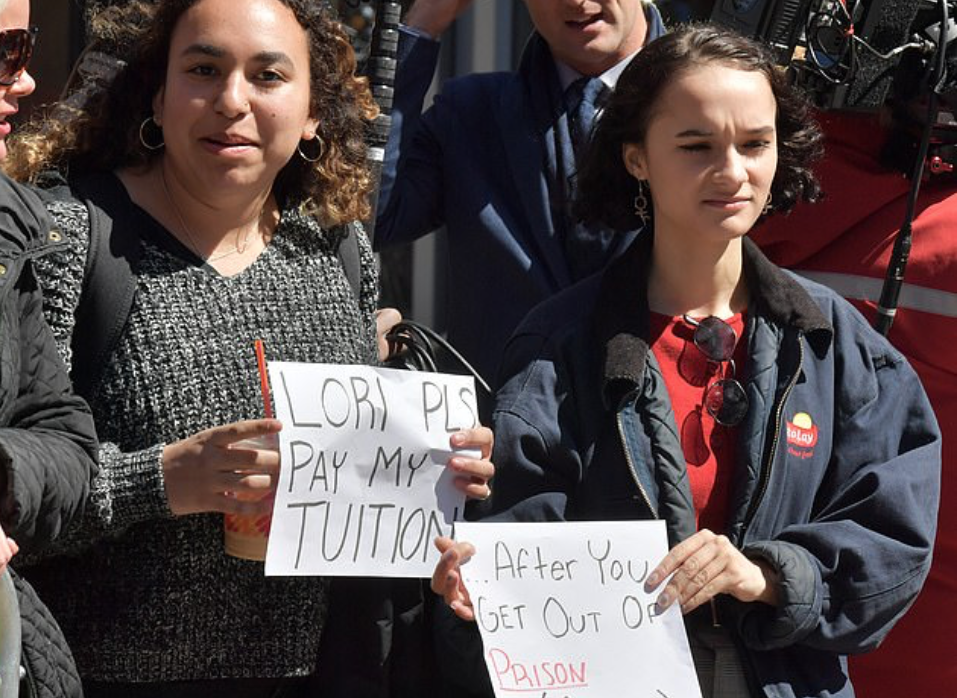CommentsEDUCATION POLITICS--The actress Felicity Huffman—along with 13 other parents charged in the college admissions scandal—entered plea deals last week, putting pressure on actress Lori Laughlin and her husband, designer Mossimo Giannulli, to do the same.
Prosecutors are hinting that if Laughlin doesn’t accept a deal, she could face 20 years in prison, 3 years of probation, and a $250,000 fine.
I have enjoyed EVERY SINGLE SECOND of this scandal and its coverage. It has exploded so many of the lies we tell ourselves about America being a fair and just society—especially when it comes to access to higher education. For those who think about class, this scandal has been like Halloween, Christmas and Easter rolled into one. Journalists and bloggers are using words like class, blue collar, elite and privilege.
Nothing of the actual details of this scandal—the bribes paid, the photos photoshopped, the tests taken by fakers—have shocked me. What has surprised me, however, is that journalists and bloggers have been using this scandal to talk about class and inequality. As sociologist Shamus Khan wrote in The Washington Post, “the true tragedy is that almost all rich families buy their kids into elite colleges by purchasing advantages they pass off as talents, whether by way of sailing lessons or elaborate vacations planned with an eye on admissions essays. We view these vastly overrepresented children of the rich as having earned their spots.” This, another blogger concurred, “is the real scandal.”
These comments point to the many ways that rich people get their kids into college. On the lower end of the scale is all the money many of us are able spend on music lessons, test prep, elite soccer programs, and summer-abroad service project opportunities for our kids—to name a few of the advantages families like mine can afford. At the next level are the parents who can afford to send their kids to expensive and prestigious prep and boarding schools. And, finally, at the top tier, are the parents who can donate tens of thousands or even millions of dollars to college campuses in return for a guarantee of their child’s entry into said college. As many have noted in reporting on the admissions scandal, Jared Kushner’s parents got him into Harvard by donating 2.5 million dollars a few years before Kushner applied.
The Associated Press turned to Richard V. Reeves, whose book Dream Hoarders showed how the upper echelon hoards all the best opportunities for itself. As Reeves commented on the scandal, “[f]or most people outside the elite, these institutions might as well be on the moon. This story just reinforces that, the way in which money buys opportunity in America.”
Even Fox News declared that the “COLLEGE CHEATING SCANDAL SHOULD MAKE BLUE-COLLAR FAMILIES ABSOLUTELY FURIOUS” (all caps in the original).
Writers reveling in this scandal have even pointed out that the origin story for the very word “meritocracy” is a hoax, coined by the British writer in 1958 with his fictional, The Rise of the Meritocracy, a satirical criticism of the concept of meritocracy.
So, hat gives? Has the chattering class joined the revolution? Probably not.
On the other hand, something has shifted in the American political terrain, and the shift has two origins and three palpable impacts. The first origin is the global financial collapse of 2008. From the early radical critiques of the collapse and the Marx-informed analyses provided by economists like Thomas Piketty, to the new working class-centric language of Occupy Wall Street and the discovery of the 99%, to the now completely normalized presidential candidate proposals such as Medicare for All, universal basic income, and free college, we are gradually becoming a nation that sees inequality for the crisis it is.
The second shift was produced by the election of Donald Trump. On the one hand, Trump showed that a populist strain of anti-neoliberalism—nativist, protectionist, bring-industrial-jobs-back, anti-trade, pro-tariff—could be part of a winning rhetoric. At the same time, Clinton’s campaign made clear that a Goldsmith’s, big-Pharma, Tech-sector-backed Democratic candidate would not take radical, pro-working-class positions. Even now many Congressional leaders who are still beholden to the super-rich reject the idea that workers need a living minimum wage of $15.00 an hour (and more).
The first impact of this shift is the resurgence within the American labor movement. Massive strikes, currently of grocery store workers (on strike in the Northeast), graduate student workers at the University of Illinois, Sacramento teachers last week, and the LA Unified School District teachers earlier this year. Corey Robin has called the massive wave of teachers’ strikes across the country the “real resistance” movement in the US today.
The second outcome has been the emergence of politicians who are willing to address class in a way that we have not seen since the 1930s. Alexandria Ocasio-Cortez is one, of course, but there are others, too, including Elizabeth Warren and Bernie Sanders. In Chicago, six City Council representatives were just elected with backing from the Democratic Socialists of America. Even the not-much-talked-about presidential candidate Andrew Yang is running his own universal basic income experiment (N=1) in New Hampshire.
The third sign of this shift revealed itself in this admissions scandal coverage: the willingness of ordinary journalists and bloggers to write explicitly about class. While many of us in Working-Class Studies have been doggedly pointing out the presence and importance of class in our academic and public facing work, for many years, it seems, that the rest of the world is finally catching up.
Now, to the barricades!
(Kathy M. Newman is an Associate Professor of English at Carnegie Mellon University and author of Radio-Active: Advertising and Activism 1935-1947. This piece was posted originally at Working-Class Perspectives and most recently at New Geography, edited by Joel Kotkin.)
-cw
















